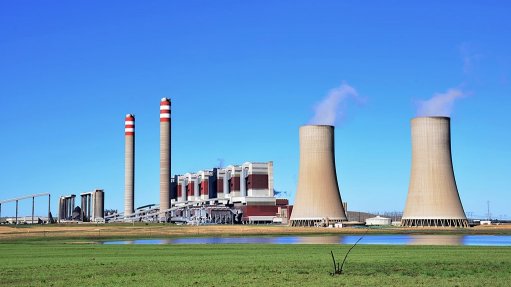
MAJUBA POWER STATION Eskom's privater coal line will transport 21-million tonnes of coal to the Majuba power station
Photo by: Duane Daws
State-owned power utility Eskom’s Majuba rail project has had to deal with several challenges since it started in 2013. Subsequently, Eskom has revised the project’s completion date to December 2017, says Majuba rail project communications and stakeholder management head Khululiwe Xulu.
The project, which was initially scheduled for completion in May 2016, is meant to establish a 68-km-long, heavy-haul private railway line between coal mines west of Ermelo, in Mpumalanga, to the Majuba power station, located between Amersfoort and Volksrust, north of KwaZulu-Natal.
According to Xulu, the challenges curently facing the project include several delays, owing to difficult site conditions, such as water seepage and mudrock, community unrest that affects the projects’ workforce and some contractors’ issues that were resolved in the contractual process.
She claims that, to date, about 40% of the project has been completed, with about 87% of the civil and earthworks physically completed, including the construction of a 300 m incre- mental launch bridge over the Vaal river, which was completed in July.
Xulu adds that the bridge was the most complex concrete structure to be built in the civil works package and highlights that civil works contractor Aveng Grinaker-LTA was honoured by Construction World Magazine for its successful project completion.
Other structures – most of which were completed in September – include 96 culverts, nine cattle creeps, 32 agricultural under- and overpasses, 18 bridges, one service duct and 40 cattle grids.
The coal line is located in the Gert Sibande district municipality and will traverse two local municipalities, Msukaligwa and Pixley Ka Seme, with rail takeoff accessible from both directions of Transnet Freight Rail’s (TFR’s) existing coal corridor to Richards Bay.
The line is meant to transport 21-million tonnes of coal to the Majuba power station, thereby alleviating pressure on Mpumalanga’s roads.
Eskom has yet to reach an agreement with TFR pertaining to its operational responsibili- ties in terms of the Majuba project, but Xulu says discussions are in progress and should be finalised soon.
Meanwhile, Eskom’s rail projects programme manager, Ernest Dlamini, notes that the overall budget of the project has increased by R800-million and now stands at R6-billion.
Socioeconomic Impact
Xulu highlights the Majuba rail project as part of Eskom’s road-to-rail migration strategy, a strategic initiative that involves the transportation of coal to power stations on rail instead of by road.
“The initiative seeks to reduce road-safety incidents as well as the environmental risks associated with road transportation of coal,” she says, explaining that reduced road traffic on Mpumalanga roads will result in less carbon emissions and improved road conditions.
The project is expected to create between 2 500 and 3 000 direct construction employment opportunities at its peak, with several indirect opportunities also available, Dlamini adds.
He points out that Eskom will continue to source unskilled and semiskilled workers from the local communities and farms surrounding the railway line servitude.
“The project further hopes to spend money on corporate social investment programmes, as well as local supplier development and economic participation in the project. A number of small and medium-sized enterprises (SMEs) have also benefited from the project through various subcontract packages.”
Other contractors for the project include Aveng Rail, which is responsible for permanent way, or per way, infrastructure; Suka Projects, for general maintenance and horticulture; and Sheppard Protection Services, for security. Dlamini adds that a successful bidder for the electrical and signalling package has been identified and will be notified.
The electrical package consists of the overhead traction equipment, signalling systems and traction/auxiliary substations. A contract for the 88 kV overhead line to feed the traction/auxiliary supplies substations has been awarded to Conco Power Project.
Xulu concludes that the project has been “executed mainly by Eskom project managers, with no involvement from foreign management contractors . . . to save costs and provide opportunities for experienced locals who are competent and suitably qualified to execute complex projects”. It forms part of Eskom’s deliberate investment in local skills.